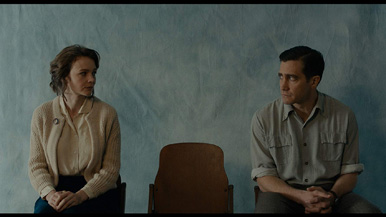|
|
Movie Review: WildlifeBy Matthew HuntleyNovember 14, 2018
Until then, though, Joe must endure being short and admit hard truths to himself, like the fact he doesn’t even like football, which he hesitates to tell his father, Jerry (Jake Gyllenhaal). Jerry, a wannabe golf pro, has recently moved his wife Jeanette (Carey Mulligan) and Joe to Great Falls, Montana because he got a job as a golf instructor at the local country club. But it’s evident such a move, like others in the past, was impulsive because Jerry was so desperate to find work and provide for his family, but we soon learn his hastiness and pride often get the better of him. When Jerry is fired from the club for taking bets with the club members (“I got fired for being nice”), the family suddenly finds itself struggling to make ends meet. Jeanette, once a teacher herself, suggests she go back to work, but the mere thought makes Jerry cringe and creates unexpressed anger and resentment. But because he refuses to work menial jobs like bagging groceries, Jeanette has no choice and becomes a swim instructor at the local YMCA. Jerry, meanwhile, takes to sleeping in his car during the day and staring off into space at night, using cigarettes and alcohol as vices for his remorse and stress. Joe, wise beyond his years, also notices his father sleeping on the couch and realizes the strain between his parents goes beyond money and jobs. He’s not exactly sure what else is at play, and perhaps no one is, which makes it all the more frustrating, but hence life often being inexplicable. Eventually, Jerry signs up to be a firefighter, knowing full well he’ll be sent to the state’s surrounding mountains to contain the wildfires, a move that not only puzzles but infuriates Jeanette (“Why would you want to work a job where you’ll probably get killed?!”). She knows this is just Jerry’s way of leaving and perhaps neglecting his familial responsibilities. But Jerry leaves anyway, while Joe has taken a job with the local photographer. And with his father gone, Joe becomes a first-person witness to the undoing of his parents’ marriage as Jeanette begins to reclaim her youth, dressing less like a mother and housewife, drinking more, and entertaining overbearing men like the lascivious Warren Miller (Bill Camp). What Joe sees and what events transpire, I’ll not reveal, but the value of “Wildlife” is in its patience, and in its slow yet steady examination of the characters as they grasp and react to their changing worlds, which have shifted without warning. As a first-time director, Dano not only displays great control over his story but also exhibits tremendous restraint by not allowing it to succumb to forced or over-the-top melodrama. It must have been tempting for him and the cast to want to heighten the intensity of the characters’ emotions and simply let things spiral control because it would have been more sensational and “entertaining,” but that would have been too easy. Instead, they choose a more honest and understated route, and the result is a film that resonates and reminds us that when it comes to life’s unexpected wrenches, there’s no set, narrative way with which we’re supposed to deal with them. There’s also no guarantee of how they’ll turn out. The best we can do, just as Joe does, is stay focused, keep a level head, and do what we have to do to survive, all of which are harder to do the older we get.
|

|
|
|

|
Friday, April 19, 2024
© 2024 Box Office Prophets, a division of One Of Us, Inc.


